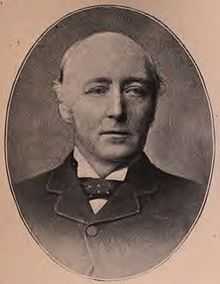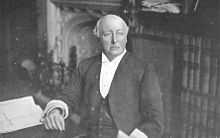William Gully, 1st Viscount Selby
| The Right Honourable The Viscount Selby QC PC | |
|---|---|
 | |
| Speaker of the House of Commons | |
| In office 1895–1905 | |
| Monarch | Victoria Edward VII |
| Preceded by | Sir Arthur Peel |
| Succeeded by | Sir James lowther |
| Personal details | |
| Born | 29 August 1835 |
| Died | 6 November 1909 |
| Nationality | British |
| Political party | Liberal |
| Spouse(s) | Elizabeth Selby (d. 1906) |
| Alma mater | Trinity College, Cambridge |
William Court Gully, 1st Viscount Selby QC, PC (29 August 1835 – 6 November 1909) was a British lawyer and Liberal politician. He served as Speaker of the House of Commons between 1895 and 1905.
Background and education
Gully was the son of Dr James Manby Gully of Malvern, a successful physician who became involved in the mysterious death of Charles Bravo in April 1876. His grandfather was Daniel Gully, a Jamaican coffee planter. He was educated at University College School, London and then Trinity College, Cambridge,[1] where he was president of the Union. He was called to the bar by the Inner Temple in 1860, went the northern circuit, and took silk in 1877.
Political career

In 1880 and 1883 Gully unsuccessfully contested Whitehaven as a Liberal, but was elected for Carlisle in 1886, and continued to represent that constituency until his elevation to the peerage. In April 1895 he was elected Speaker by a majority of eleven votes over Sir Matthew White Ridley, the Unionist nominee. The choice of Gully was a surprise to Lord Rosebery's cabinet. Rosebery did not want a Unionist as the new Speaker of the House of Commons, but rejected the two alternatives of Richard Haldane and Sir Frank Lockwood. Rosebery faced hostility in his cabinet from Sir William Vernon Harcourt and from the opposition, and Harcourt wanted the Liberal Unionist `Leonard Courtney as Speaker. Harcourt viewed this as purely a matter for the House of Commons (Rosebery being in the House of Lords). To Rosebery it became a minor cabinet crisis. Finally in disgust Harcourt placed the onus of the decision on Rosebery. Eventually the backbenchers of the Commons who knew Gully propelled him - most likely because he was close to Sir William Herschell. Harcourt was forced to produce the name to the House of Commons. The Conservatives were not happy about his selection, and (recalling the scandal that engulfed his father) would greet his appearance in the House with cries of "Bravo, Gully!".[2] In 1905 he resigned and was raised to the peerage with the title of Viscount Selby, of the City of Carlisle, the name being that of his wife (see below).
Family

Lord Selby married Elizabeth (d. 1906), daughter of Thomas Selby, in 1865. He died in November 1909, aged 74, and was succeeded by his son, James.
Notes
- ↑ "Gully, William Court (GLY851WC)". A Cambridge Alumni Database. University of Cambridge.
- ↑ Ruddick, p. 185
References
 This article incorporates text from a publication now in the public domain: Chisholm, Hugh, ed. (1911). Encyclopædia Britannica (11th ed.). Cambridge University Press.
This article incorporates text from a publication now in the public domain: Chisholm, Hugh, ed. (1911). Encyclopædia Britannica (11th ed.). Cambridge University Press.- James, Robert Rhodes. Rosebery: A Biography of Archibald Primrose, Fifth Earl of Rosebery. New York: The Macmillan Company, 1963, 1964, p. 371-373.
- Leigh Rayment's Historical List of MPs
- Ruddick, James. Death at the Priory: Sex, Love, and Murder in Victorian England. New York: Atlantic Monthly Press, 2001. ISBN 0-87113-832-8. (P. 185).
External links
- Hansard 1803–2005: contributions in Parliament by William Gully, 1st Viscount Selby
| Parliament of the United Kingdom | ||
|---|---|---|
| Preceded by Robert Ferguson |
Member of Parliament for Carlisle 1886 – 1905 |
Succeeded by Frederick William Chance |
| Preceded by Sir Arthur Peel |
Speaker of the House of Commons 1895 – 1905 |
Succeeded by Sir James Lowther |
| Peerage of the United Kingdom | ||
| New creation | Viscount Selby 1905 – 1909 |
Succeeded by James Gully |
| ||||||||||||||||||||||||||||||||||||||||||||||
.svg.png)